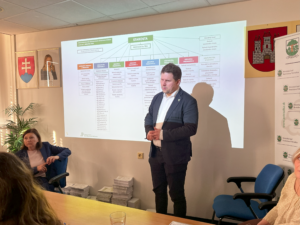Experts from Bosnia and Herzegovina visited the Ministry of Finance of Slovakia and two Slovak local governments to learn about internal control systems.
20 local government and cantonal experts from Bosnia and Herzegovina, along with representatives from the Federal Ministry of Finance and the Ministry of Administration and Local Self-Government from Republika Srpska, visited the Ministry of Finance of Slovakia and two Slovak local governments to learn about internal control systems.
Bosnia and Herzegovina, like other countries in the region, is facing with a shortage of workforce, and a well-structured internal control framework can significantly contribute to goal attainment and the efficient management of public funds. There is an urgent need to strengthen the internal control system and foster awareness regarding its pivotal role in enhancing operational efficiency, improving organizational management, and ensuring prudent budget expenditure.
To help the country in the endeavours to improve its existing internal control systems and comply with the standards set by the European Commission, a study visit to Slovakia was organized. The aim was to strengthen their capacities by sharing experiences and best practices of internal control in public administration in Slovakia. Among the participants were representatives of the Ministry of Finance of the Federation of Bosnia and Herzegovina as well as representatives of some municipalities and cantons.
“We had the opportunity to exchange good practices with Slovak colleagues and discuss the importance of internal controls, digitalization and the focus on the welfare of citizens. I strongly believe that some of the acquired experience will be applied in our organizations in the future and that we will continue our good cooperation with the Ministry of Finance of the Slovak Republic”, said Belma Islamović from the Central Harmonization Unit in the Ministry of Finance of the Federation of Bosnia and Herzegovina, a sector that issues regulations and methodologies in the field of internal controls.
Tailor-made agenda serves the purpose best
The study visit agenda was based on the specific requirements of the partners. They learned about the Slovak public sector accounting and reporting legislative and methodological framework, technical and institutional requirements of the MF SR for financial control and audit, budget system and fiscal rules for local governments, and the DEUS information system. To see the application of legislation in practice, they visited the Self-Governing Trnava Region and the City District of Petržalka. Through dialogue and discussions, participants had the chance to seek clarification on any queries or uncertainties they may have.
“Study trip to the Slovak Republic was very important for me personally, and I will try to use the knowledge and experience gained to improve the financial management and control system, which I implement as a coordinator in the Ministry of Finance of Posavina Canton” said Marko Živković from the Ministry of Finance of Posavina Canton.
‘Many participants play key roles in coordinating the development of internal controls within their LGs/cantons and can advocate for the adoption of best practices to decision-makers and senior management. We hope the good practices of the Slovak Republic will be successfully applied throughout the public sector,’ said Maja Smrzlić from UNDP office in Bosnia and Herzegovina.
About
The study visit was organized within the framework of the Public Finance for Development (PFD) programme, which is a joint initiative of the Ministry of Finance of the Slovak Republic and the United Nations Development Programme (UNDP). The programme is aimed at providing technical assistance and capacity building to institutions in Eastern European and Western Balkan countries preparing to join the European Union.
Bosnia and Herzegovina became one of the programme partner countries in 2020. Read more: https://bit.ly/PFD_BIH





